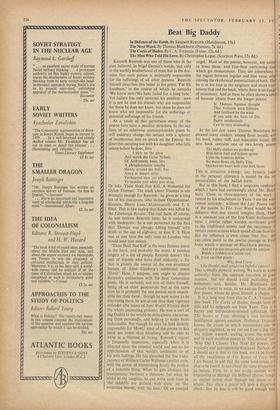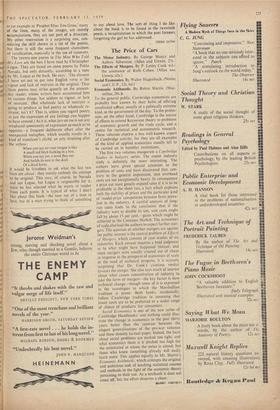Beat Big Daddy
In Defence of the Earth. By Kenneth Rexroth. (Hutchinson, 15s.) The Next Word. By Thomas Blackburn. (Putnam, 7s. 6d.)
The Cocks of Hades. By C. A. Trypanis. (Faber, 12s. 6d.)
The Man Who Told His Love. By Christopher Logue. (Scorpion Press, 12s. 6d.)
Kenneth Rexroth was one of those who in the past believed, in Nigel Dennis's words, 'not only in the earthly brotherhood of man, but in the doc- trine that each person is intimately responsible for the sufferings of all other persons.' Rexroth himself describes this belief in his poem 'For Eli Jacobson,' in the course of which he remarks 'We know now/We have failed for a long time.' Yet failure has only reversed his position : now it is not he and his friends who are responsible for those he does not know, but those he does not know who are responsible for the sufferings or potential sufferings of his friends.
As a result of this perversion many of the poems here have a peculiar structure. In the last lines of an otherwise unexceptionable poem he will suddenly change the subject with a splutter of incoherence into an attack on the Enemy. He describes camping out with his daughter, who falls asleep before he does; then
. . . I pick up the glass
And watch the Great Nebula Of Andromeda swim like A phosphorescent amoeba Slowly around the Pole. Far Away in distant cities Fat-hearted men are planning To murder you while you sleep.
Or take 'Thou Shalt Not Kill, A Memorial for Dylan Thomas.' The truth about Thomas is not dramatic enough for Rexroth : he gives us a long list of his murderers, who include' Oppenheimer, Einstein, Henry Luce,, Mademoiselle and T. S. Eliot. This is like saying that Keats was killed by the Edinburgh Review. The real facts, of course, do not interest Rexroth here; he is concerned with tendencies : he is not perturbed by the fact that Thomas was already killing himself' with drink at the age of eighteen, or that T. S. Eliot was at one time the only man in London who would lend him money.
'Thou Shalt Not Kill' is the most famous poem in the book, and probably the worst. It consists largely of a list of people Rexroth doesn't like and of friends who have died violently, a list that is plainly the source of the one structural feature of Allen Ginsberg's celebrated poem 'Howl.' Here, I suppose, one ought to discuss Rexroth's connection with the Beat Generation poets. He is certainly not one of them himself, being of an older generation; but at the same time he is probably the one person most respon- sible for their fame: though he now seems to be disowning them, he was at one time their vigorous defender (the issues of New World Writing show the whole interesting process). He was a sort of Big Paddy to the would-be delinquents, encourag- ing them personally, and helping to make them fashionable. But though he may be held directly responsible for 'Howl,' most of the poems in this book are better than Ginsberg will be able to write in a lifetime of trying. Rexroth's vigour is frequently impressive, especially when it is directed upon the external world and not on his apprehension of that world's tendencies or of his own feelings. He has absorbed the fine trans- parency of William Carlos Williams's earlier style, with the power of transcribing firmly the outline of a concrete thing. When he gets abstract, the transparency becomes a thinness; but when he sticks to the tangible, he can write such lines as `the sidehills are piebald with snow' or 'the mountain beaver, with the face/ Of an overfed angel.' Most of the poems, however, are writt in loose three- and four-beat unrhyming lin which get monotonous. They are somewhere the region between regular and free verse, oft missing the rhythmical potentialities of both. Th he is at his best in the epigrams and short tran lations that end the book, where there is no dang of monotony. And in these he often shows a sen of humour absent from the longer poems.
St. Thomas Aquinas thought That Vultures were lesbians And fertilised by the wind. If you seek the facts of life, Papist intellectuals Can be very misleading.
In the last few years Thomas Blackburn h pleased many readers, among them myself, wit his hard, rather stiff, and masculine talent. new book contains one or two lovely poem
The Holly chokes my garden up With bitter fruit and lichens spawn Upon the fountain deities.
No water flows, oh, Holly Tree, Quicken my heart with your dark thorn.
This is attractive writing : any hysteria late in the personal utterance is muted by the i personalities of the ballad form.
But in this book .1 find a suspicion confirm which I have had increasingly about Mr. Black burn. Close to three-quarters of his work ruined by his attachment to Yeats. I use the word ruined seriously : without the Last Poems mos' of the poems in The Next Word would be SO different that one cannot imagine them. The is a constant use of the late-Yeats declamatory tone, a similar rather wooden movement given to the traditional metres and the recurrence of certain constructions which sound all too familiar. But the influence is even closer than this : one can often point to the precise passage in Yeats from which a passage of Blackburn derives.
And so I praise the goose-girl and the scullion
Beside a midden or a refuse cart.
Or, from another poem : Why must I rave
Like Hamlet, mad tonight on Ophelia's grave? This is simply parasitic writing. We learn to write. certainly. from 'the constant imitation of great masters,' but we should avoid publishing our imitations—and, besides, Mr. Blackburn has already learnt to write, as we can see from those few poems where he gives himself a chance.
It is a long way from this to C. A. Trypanis's, new book The Cocks of Hades, though both its title, and its epigraph are from Yeats. This is a happy and independent-minded collection, like The Stones of Troy, showing a man balancing intelligence against emotion. Professor Trypanis knows the extent to which connotation can be properly exploited, as we can see from a line like 'the yellow warmth, wading across the wheat': and in such excellent poems as 'The Arrival' and `Why Did I Choose That Man' his powers are modestly and appropriately displayed. Perhaps all I should say is that in this book are to be found all the excellences of The Stones of Troy. But I am bound to add that the same weaknesses are also to be found, in just about the same proportion as before. First, he is too easily content with impressing us through the brilliant phrase, image or epithet rather than through the poem as a whole. Too often a poem*. will give a dispersed effect: line by line it will be good enough but,
ha /it Hi ft ht in igr
as for example in Prophet Elias Tou Grou,' many of the lines, many of the images, are merely accumulations, they are not part of a structure. My other reservation is a surprising one, con- sidering the skill shown in a lot of the poems, but there is still the same frequent clumsiness of versification, especially in the use of runovers.
The twenty-one poems in The Man Who Told Ilis Love are the best I have read by Christopher Logue. They are based on some poems by Pablo Neruda, but only distantly, according to a note by M r. Logue at the back. He says: 'The element I have set out to put into English verse is the vigour and lack of restraint in the original. Thus these poems may strike queerly on the present- :, day reader, whose writers have accustomed him to various things, but seldom to vigour, or lack of restraint.' (But wholesale lack of restraint is going to produce as bad poetry as wholesale re- straint, isn't it? That is, unless you regard poetry as just the expression of any feelings you happen to have around.) As it is, what jars on me is not any misplaced spontaneity of expression so much as its opposite—a frequent deliberate effort after the unexpected metaphor, which usually results in a kind of translator's cliché, an arty straining after the artless :
When you say no your tongue is like A small red bitch barking in a box. When you say yes, a wren flies out And builds its nest in the skull Of a dead horse.
It would be frivolous to ask what the last two lines are about: they merely embody the attempt to be original. This may, of course, be Neruda and not Logue, but Logue is responsible for it, since he has selected what he wants to render from each poem. It is typical of Vvhat I don't like about this book—the tone not of a man in love, but of a man trying to think of something to say about love. The sort.of thing I do like about the book is to be found in the twentieth' poem, a recapitulation in which the poet foresees forgetting the girl he has addressed.
THOM G UNN







































 Previous page
Previous page